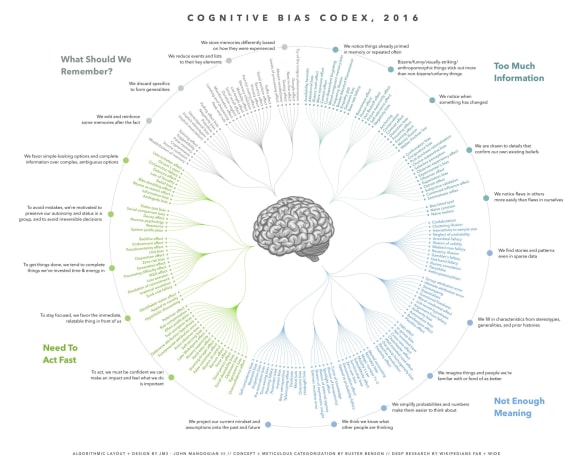Improving Your Chances With Non-Negotiables
Jan 14, 2020 · 5min read
Your chances of winning any game improve drastically once you learn the rules. But what if there aren’t any clear rules? Non-Negotiables are here to help.
Playing Games at Work ¶
Simon Sinek teaches us that one can’t really “win” at work because it’s a different kind of game than sports:
Fair point, so let’s use “winning” as a synonym to “being successful”. To be consistently successful at work you need to know what rules define success so that you can repeatedly achieve it and—according to Simon Sinek—“stay in the game”.
Know the Referees ¶
Unfortunately, there are no strict, clear and stable rules for success at work. But there are referees: Your boss or client will tell you how you did.
In most cases, you will get feedback * afterward*. There are plenty of approaches however to minimize the risk of learning too late if you are on the right track. Some methods try to take all the risk out by defining upfront as much in detail as possible. Others try to split the larger body of work into smaller parts and getting feedback throughout, not only at the end.
Of course, these methods depend on a few fragile conditions:
- Your boss or client knows what they want.
- Your boss or client means what they say.
- You understand what they mean and want.
Given all the cognitive biases your boss, your client and yourself are subject to as human beings, there’s still a high probability that you will ultimately be limited in your success. Phrases like “No, that’s not what I meant” and “No, that’s not how I understood it” may seem all too familiar.

I’ve written another article about a complementary concept called RATs. It addresses the inherent flaws of verbal communication and uses experiments to test the riskiest assumptions: Show, don’t tell!
While RATs are a big help to better understand your boss or client at a given moment, the results of the experiments might become outdated over time and you wouldn’t know unless you repeated your experiments regularly. That’s not very practical, so let’s add some sort of stable playing field: with Non-Negotiables.
Make the Rules Known to the Referees—Your Rules ¶
In our strategy and innovation team at the Swiss Broadcast Corporation SRG SSR, we recently started to employ a tactic called Non-Negotiables. We are in charge of corporate strategies and partnerships in the area of technology. Now, when starting to work on something new, we take time to determine what our Non-Negotiables are before collaborating with all the units and departments that need to be involved in the work.
Taking time to define your Non-Negotiables (individually or as a team) will help you in several ways:
- You discover your or your team’s real priorities. If done in teams, members will negotiate about the team’s Non-Negotiables, revealing more about themselves. You will get to know your team members better.
- Your team is aligned on what’s negotiable and what’s not. Everyone on the team can confidently start collaborating with third parties, all representing the same team position and not making promises that the team can’t keep. Also: It becomes much harder for stakeholders to divide and conquer your team by asking for personal favors.
- In case your Non-Negotiables are questioned, you can defend your position better since you (and your team) have taken time in advance to weigh all the pro and contra arguments. This also puts everyone in your team in a good starting point to negotiate since they know where it’s OK to make counteroffers.
- This approach allows you to find out who your real opponents are. A stakeholder who is against all your Non-Negotiables must be managed differently than someone who is against all that can be negotiated.
Pro Tip ¶
Ask your boss or your clients for their Non-Negotiables, too: What’s off-limits for them? I’m certain it will help your mutual understanding and collaboration, too.
How We Find Our Non-Negotiables ¶
Some Non-Negotiables are nothing but common sense. You can discover them by simply asking “Is it me/us that should or even can do this work?” Some stuff is below your paygrade, so asking you to do it is essentially wasting money because someone else with a lower salary could do it just fine. Other stuff is above your paygrade, so asking you might be wasting money, too, if your position lacks the necessary authority to successfully deliver the required work.

For any other work that fits our paygrade, we determine our Non-Negotiables this way:
First, we get started on a draft that we iterate once or twice. Then we seek early feedback from some friendly users. Even if the feedback was positive, we put in another iteration or two. At this point, things begin to stabilize. That’s when we test what happens if we remove individual parts one at a time:
- If the remainder of your work becomes undeliverable according to your standards due to the missing piece, you identified a Non-Negotiable.
- If removal has some impact on the quality of your work but doesn’t completely impair it, you have discovered a part open for debate. These portions can be useful later as bargaining chips in case collaborators question your Non-Negotiables.
- If the rest still makes perfect sense, get permanently rid of what you just removed. You got one step closer to perfection!
Perfection is achieved not when there is nothing more to add, but when there is nothing left to take away.
Antoine de Saint-Exupéry
What Happens if Your Non-Negotiables Get Overruled ¶
There’s always the possibility that your boss or client doesn’t care about your Non-Negotiables and simply demands from you to still deliver your work. As long as you’ve properly flagged the increased risk of failure to them, one important thing happens:
Your boss or client takes on the full accountability in case of failure.
Make sure to let them know about this next time they overrule your Non-Negotiables!

Michael Schmidle
Founder of PrioMind. Start-up consultant, hobby music producer and blogger. Opinionated about technology, strategy, and leadership. In love with Mexico. This blog reflects my personal views.
Jun 4, 2022 · 6min read
The Power of Subtractive Thinking
What’s better: more success or less failure? More possibilities or less impossibilities? Let’s take a look at the seemingly pointless question—and discover the surprising answer. Continue…
Jan 15, 2021 · 10min read
S2S: Stairs to Success
For most of us, success depends on the interaction with other human beings. S2S is a simple method that can help you be more successful. I’ll show you how. Continue…
Feb 28, 2019 · 7min read
Test Your Way to Success
Ever spent too much time on something that turned out to be based on the wrong assumptions? Here’s how to make sure that you’re investing your time correctly. Continue…
Oct 6, 2024 · 4min read
Revolutionizing Decision-Making
Last year, I shared a simple framework for making better decisions. Little did I know it would spark a journey that led to creating PrioMind, an app that’s revolutionizing how we approach choices. Here’s the story of how four criteria evolved into a powerful decision-making tool, and what I’ve learned along the way. Continue…



